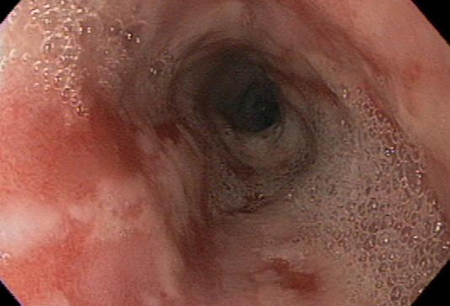Summary
Definition
History and exam
Key diagnostic factors
- heartburn
- acid regurgitation
Other diagnostic factors
- dysphagia
- bloating/early satiety
- laryngitis
- globus
- enamel erosion
- halitosis
- dyspepsia
Risk factors
- family history of heartburn or GERD
- older age
- hiatal hernia
- obesity
- use of lower esophageal sphincter (LES) tone-reducing drugs
- psychological stress
- asthma
- use of nonsteroidal anti-inflammatory drugs (NSAIDs)
- smoking
- alcohol consumption
- peroral endoscopic myotomy (POEM)
- dietary factors
- pregnancy
Diagnostic tests
1st tests to order
- proton-pump inhibitor (PPI) trial
Tests to consider
- esophagogastroduodenoscopy (EGD)
- ambulatory pH monitoring
- esophageal manometry
- combined impedance-pH testing
- barium swallow
- esophageal capsule endoscopy
Emerging tests
- endolumenal functional lumen imaging probe
Treatment algorithm
initial presentation
nonpregnant: proton-pump inhibitor-responsive
nonpregnant: incomplete response to proton-pump inhibitor
pregnant: intractable symptoms or complicated reflux disease
Contributors
Authors
Marc J. Zuckerman, MD
Professor of Medicine
Chief of Division of Gastroenterology
Texas Tech University Health Sciences Center
El Paso
TX
Disclosures
MJZ has been reimbursed and is on the speakers bureau for Phathom Pharmaceuticals, the manufacturer of vonoprazan.
Andres F. Carrion, MD
Gastroenterologist
GastroMed Miami
Miami
FL
Disclosures
AFC declares that he has no competing interests.
Acknowledgements
Dr Marc J. Zuckerman and Dr Andres F. Carrion would like to gratefully acknowledge Dr Sheila Feit and Dr Mohamed Othman, previous contributors to this topic.
Disclosures
SF declares that she has no competing interests. MO has acted as a consultant for Olympus.
Peer reviewers
Lars Aabakken, MD
Professor of Medicine
Chief of GI Endoscopy
Rikshospitalet University Hospital
Oslo
Norway
Disclosures
LA declares that he has no competing interests.
Lise Lotte Gluud, MD, DMSc
Consultant
Department of Internal Medicine
Copenhagen University Hospital
Hellerup
Denmark
Disclosures
LLG declares that she has no competing interests.
Gary W. Falk, MD, MS
Professor of Medicine
Department of Gastroenterology & Hepatology
Center for Swallowing & Esophageal Disorders
Cleveland Clinic
Cleveland
OH
Disclosures
GWF has received fees from: AstraZeneca (consultant, speakers bureau, grant support); Takeda (grant support); Pentax (speaker, travel); Wyeth (consultant); and C2 Therapeutics (consultant).
Peer reviewer acknowledgements
BMJ Best Practice topics are updated on a rolling basis in line with developments in evidence and guidance. The peer reviewers listed here have reviewed the content at least once during the history of the topic.
Disclosures
Peer reviewer affiliations and disclosures pertain to the time of the review.
References
Key articles
Katz PO, Dunbar KB, Schnoll-Sussman FH, et al. ACG clinical guideline for the diagnosis and management of gastroesophageal reflux disease. Am J Gastroenterol. 2022 Jan 1;117(1):27-56.Full text Abstract
ASGE Standards of Practice Committee, Desai M, Ruan W, et al. American Society for Gastrointestinal Endoscopy guideline on the diagnosis and management of GERD: summary and recommendations. Gastrointest Endosc. 2025 Feb;101(2):267-84.Full text Abstract
Freedberg DE, Kim LS, Yang YX. The risks and benefits of long-term use of proton pump inhibitors: expert review and best practice advice from the American Gastroenterological Association. Gastroenterology. 2017 Mar;152(4):706-15. Abstract
Ness-Jensen E, Hveem K, El-Serag H, et al. Lifestyle intervention in gastroesophageal reflux disease. Clin Gastroenterol Hepatol. 2016 Feb;14(2):175-82.Full text Abstract
Reference articles
A full list of sources referenced in this topic is available to users with access to all of BMJ Best Practice.

Differentials
- Acute coronary syndrome
- Stable angina
- Functional esophageal disorder/functional heartburn
More DifferentialsGuidelines
- Guideline on the diagnosis and management of GERD: summary and recommendations
- ACR practice parameter for the performance of esophagrams and upper gastrointestinal examinations in adults
More GuidelinesPatient information
GERD: questions to ask your doctor
Acid reflux, heartburn, and gastroesophageal reflux disease (GERD)
More Patient informationLog in or subscribe to access all of BMJ Best Practice
Use of this content is subject to our disclaimer